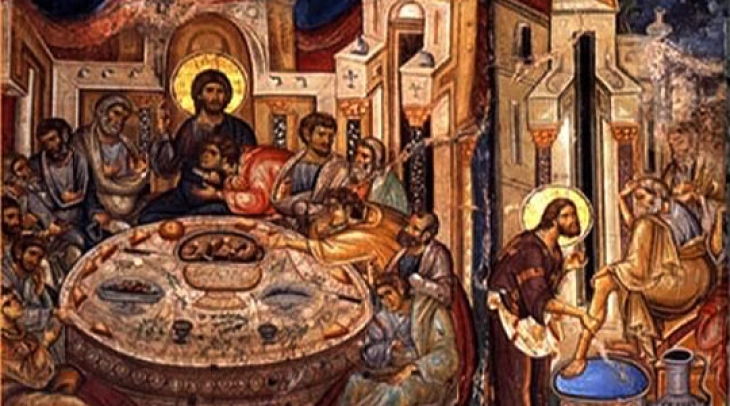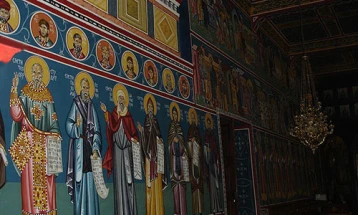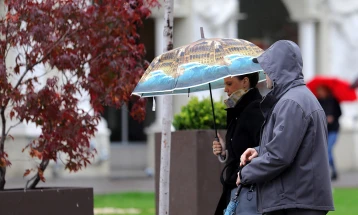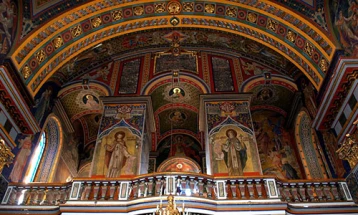Religious calendars
- Macedonian Orthodox Church Calendar; St. Prophet Nahum and St. Philaret the Merciful

14 December 2024 (MIA)
Macedonian Orthodox Church Calendar
St. Prophet Nahum and St. Philaret the Merciful
Born of the tribe of Simeon in a place called Elkosh, on the further side of the Jordan, he lived seven hundred years before Christ and foretold the fall of Nineveh two hundred years after the Prophet Jonah. The people of Nineveh had repented after hearing Jonah’s preaching, and God had protected them and not destroyed them. But, with the passage of time, they came to forget God’s mercy and turned again to evil. Nahum foretold their doom, warning them that, if they showed no repentance, they would receive no protection. The entire city was so utterly destroyed by earthquake, flood and fire that its location is no longer known. Holy Nahum lived for forty-five years before going to his rest in the Lord, leaving us a small book of his true and genuine prophecies. From the village of Amnia in Paphlagonia, Philaret was at first a man of some substance, but, as a result of his constant almsgiving, he became utterly destitute. He was not afraid of poverty, and went on with his charitable works with trust in the Lord who has said: ‘Blessed are the merciful, for they shall obtain mercy’, paying no attention to the disapproval of his wife and children. Once, when he was ploughing in his meadow, a man came to him with the news of the death of his ox in harness, and of his inability to plough with only one ox, so Philaret unhamessed his own and gave it to him. He gave away his remaining horse to a man who was called away to battle, and the calf from his remaining cow – and, when he saw how the cow pined after her calf, gave the man the cow as well. And so the aged Philaret was left hungry in an empty house. But he prayed to God, entrusting himself to Him. God does not abandon the righteous man, allowing him to be shamed in his hope. At that time, the Empress Irene was on the throne with her young son Constantine and, in accordance with the custom of the time, the Empress sent men through the whole Empire to find the best and most distinguished maiden to wed her son. By divine Providence, these men happened upon Philaret’s home and beheld his very beautiful and modest grand-daughter Maria, the daughter of Hypatia, and they took her to Constantinople. The Emperor was well-pleased with her and took her to wife, and brought Philaret and all his family to the capital, showering honour and wealth upon them. Philaret did not become proud in this change of fortune but, with gratitude to God, performed still greater deeds of charity than before, remaining thus for the rest of his days. At the age of ninety, he called all his children to him and, having blessed them and instructed them to cleave to God and His Law, foretold to each of them how their lives would develop, just as our forefather Jacob did aforetime. When he had done this, he went to a monastery and there gave his soul into God’s hands. At his death, his face shone like the sun and a sweet fragrance arose from his body, and miracles were worked over his relics. This righteous man of God went to his rest in 797. His wife and all his children and grandchildren lived and died in the Lord.
Catholic Calendar
St. John of the Cross
Born in Spain in 1542, John learned the importance of self-sacrificing love from his parents. His father gave up wealth, status, and comfort when he married a weaver’s daughter and was disowned by his noble family. After his father died, his mother kept the destitute family together as they wandered homeless in search of work. These were the examples of sacrifice that John followed with his own great love – God. When the family finally found work, John still went hungry in the middle of the wealthiest city in Spain. At fourteen, John took a job caring for hospital patients who suffered from incurable diseases and madness. It was out of this poverty and suffering, that John learned to search for beauty and happiness not in the world, but in God. After John joined the Carmelite order, Saint Teresa of Avila asked him to help her reform movement. John supported her belief that the order should return to its life of prayer. But many Carmelites felt threatened by this reform, and some members of John’s own order kidnapped him. He was locked in a cell six feet by ten feet and beaten three times a week by the monks. There was only one tiny window high up near the ceiling. Yet in that unbearable dark, cold, and desolation, his love and faith were like fire and light. He had nothing left but God -and God brought John his greatest joys in that tiny cell. After nine months, John escaped by unscrewing the lock on his door and creeping past the guard. Taking only the mystical poetry he had written in his cell, he climbed out a window using a rope made of stirps of blankets. With no idea where he was, he followed a dog to civilization. He hid from pursuers in a convent infirmary where he read his poetry to the nuns. From then on his life was devoted to sharing and explaining his experience of God’s love. His life of poverty and persecution could have produced a bitter cynic. Instead it gave birth to a compassionate mystic, who lived by the beliefs that “Who has ever seen people persuaded to love God by harshness?” and “Where there is no love, put love – and you will find love.” John left us many books of practical advice on spiritual growth and prayer that are just as relevant today as they were then.







